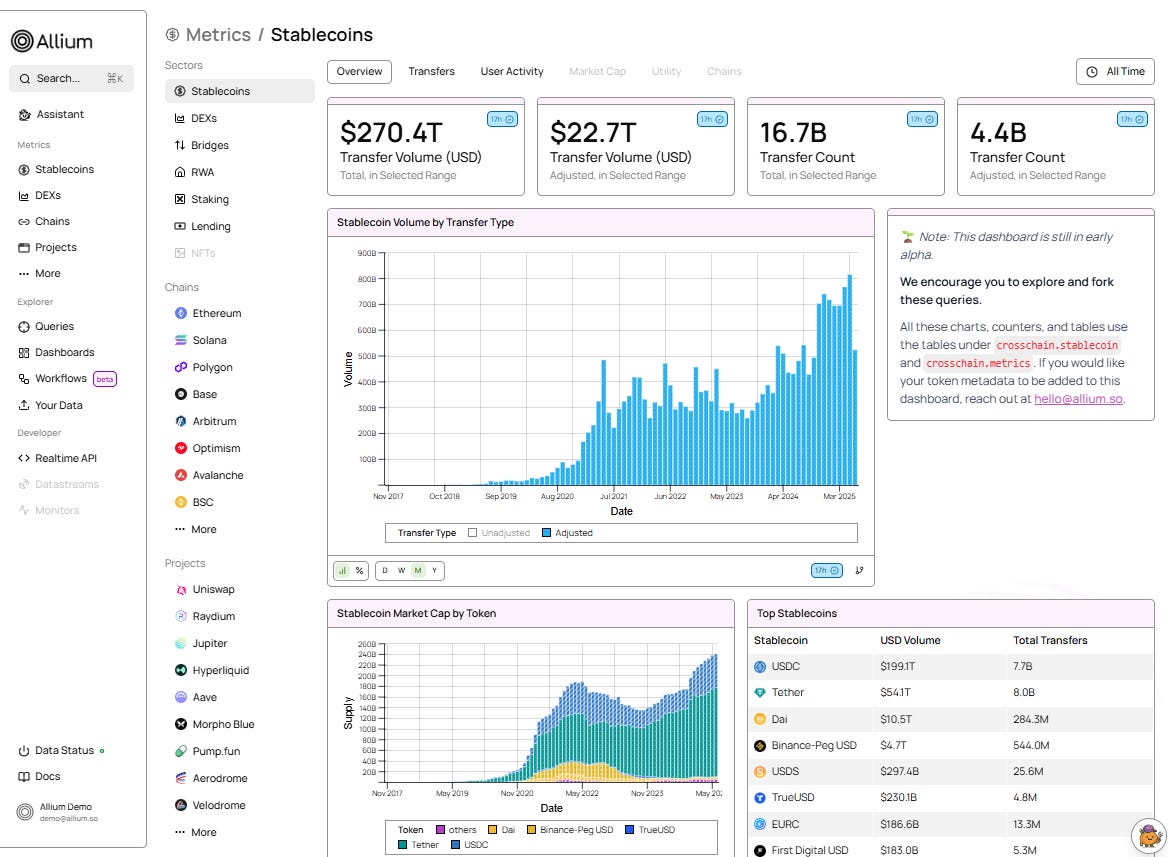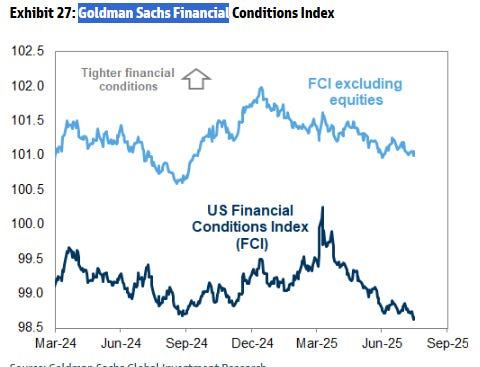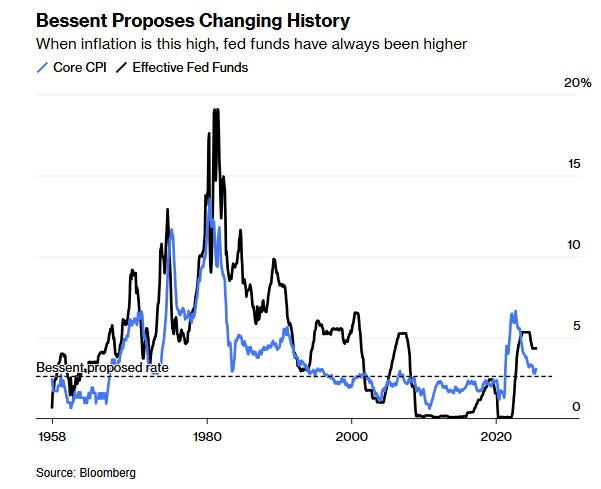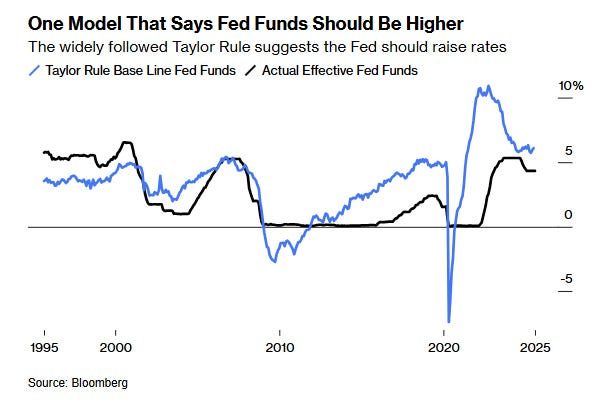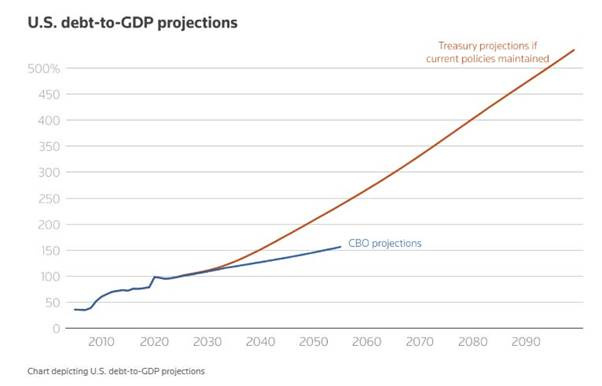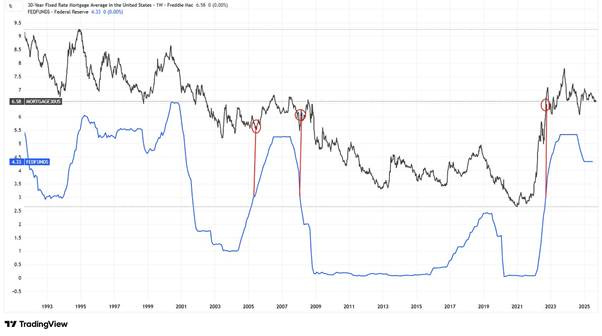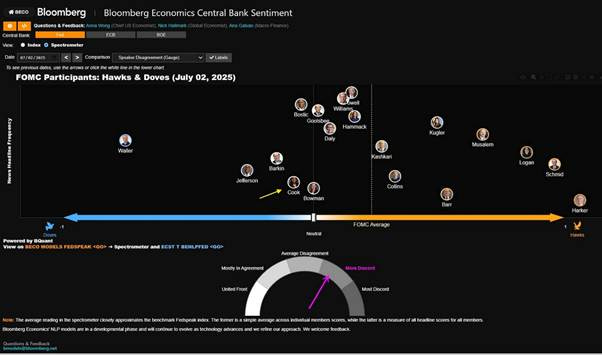WEEKLY - the misdirect: inflation and mortgages
plus: assorted links, weekend viewing and more
Hello everyone! I am NOT emotionally ready for summer to be over. I mean, yes, I love crisp autumn days and roast pumpkin and crackling leaves underfoot and cinnamon bread. But summer is languid and viscous and bright with colour. Ice cream. Watermelon. Skirts and sandals. Cool showers. A few more weeks of this would be nice.
PUBLISHED IN PARTNERSHIP WITH: ✨ALLIUM✨
Allium provides blockchain data and analytics for institutions and fintechs, helping teams generate key insights from on-chain activity. Leaders like Visa, Stripe, and Grayscale rely on Allium to power mission-critical analyses and operations.
For more information: www.allium.so.
You’re reading the free weekly Crypto is Macro Now, where I reshare/update a couple of posts from the past few days, offer some interesting links I came across in my weekly reading, and include something from outside the crypto/macro sphere that is currently inspiring me (it’s a fascinating world out there).
In this newsletter:
Inflation is part of the plan
The mortgage misdirect
Assorted links: energy, liberalism, pickleball, Brasil and more
Weekend: some unexpected KPop gorgeousness
Some of the topics discussed in this week’s premium dailies:
Coming up: war negotiations, a new Fed framework, FOMC minutes
Russia wins, Europe stirs?
Macro-Crypto Bits: PPI, retail sales, consumer sentiment, import prices, markets
Inflation is part of the plan
China and US debt
Macro-Crypto Bits: UK rate cuts and yields, the WEF, capitalism
Coming up: inflation, NVIDIA, SCO summit, GDP, sentiment
Powell’s pivot?
Macro-Crypto Bits: ETH all-time high, stock valuations, Fed minutes, PMIs, global shifts and more
Global shifts: a new section on big-picture details
The digital euro and the ECB’s increasingly desperate PR campaign
Fed independence and next steps
Global shifts: land expropriation, the new “hot spot”, Germany again, far right rising
Macro-Crypto Bits: nerves, crypto outflows, underperformance, crypto myopia again
It’s not socialism, it’s capitalism
The mortgage misdirect
Global shifts: romance, European dysfunction
Macro-Crypto bits: prices, confidence and complacency
The evolving realignment
Frayed friendship
Macro-Crypto Bits: NVIDIA, long bonds, Venezuela
A different type of military parade
Macro-Crypto Bits: reserve rotation, GDP revision, PCE, data storage
Inflation is part of the plan
Regular readers will know that I don’t think the Fed should lower rates in September – inflation is sticky, likely to head up further, and while the jobs market is looking a bit softer these days, it’s far from in a crisis. What’s more, inflation is a much bigger threat to the economy and to markets than higher unemployment as it affects everyone, especially those in the lower income bracket.
But, regardless of what Chair Powell signals on Friday, US Treasury Secretary Scott Bessent is loudly signalling that rate cuts are necessary.
Many have assumed that it’s because he wants lower yields and therefore lower interest payments to keep the deficit increase in check. But I don’t think it’s that – of course, he wouldn’t object to lower yields, but he’s a smart man and no doubt knows that monetary policy is not the main driver of the bond market.
Rather, I think his proclamations are about something else: talking down the dollar.
Before we get into why, let’s look at what he’s been saying.
He wants a 50bp cut in September, even though economically it is not warranted – inflation is still a threat, and financial conditions are loose even excluding the stock market. There is no justification at all for a jumbo cut.
(chart by Goldman Sachs, via @MikeZaccardi)
Nevertheless, Bessent is insisting that rates need to be a full 150bp lower, as soon as possible.
Why? Because, according to the Treasury Secretary, “any model” suggests we need to be lower. Any model…
First, there’s history to go by. Never has the fed funds rate been close to Bessent’s suggested 2.6% with inflation around 3%. Not once.
(chart via Bloomberg)
Plus, over the past 33 years, the Fed has only cut rates once when core CPI was above 3%, and that was last September. The bond market did not like that at all – the 10-year benchmark yield went up more than 100bp over the next four months.
The only other times in history that the Fed cut with core CPI above 3% were amid the market panic triggered by the Iraq invasion of Kuwait, the great crash of October 1987, and in 1985 as inflation was pulling back from its 1981 spike.
So, we can’t point to any historical justification here.
What about economic models? One of the most widely followed is the Taylor Rule, which calculates “equilibrium” rates based on inflation, GDP growth and estimates of the neutral rate. With current inputs, it suggests that the fed funds level is too low. Obviously, it’s possible to tweak the Taylor Rule parameters to get the result you want, but that’s not how models are supposed to work.
(chart via Bloomberg)
Again, I’m sure Bessent knows this. But rates have to come down, so he’ll say what he has to.
He’ll even go as far as appearing to meddle in the monetary policy of other nations. Earlier this month, Bessent said that he thought Japan should raise rates now, even though its core inflation rate dropped sharply in June to 3.3%, not far from the US core CPI of 3.1%. Very strange.
Now, look at the widening range of potential candidates for Fed Chair: most are not seriously being considered, but their names on a list gets them on TV talking about lower interest rates.
And, Council of Economic Advisers Chair Stephen Miran was temporarily appointed to fill the Federal Reserve Governor seat left open earlier this month by the premature departure of Adriana Kugler. This is significant, as Miran has openly advocated for a lower dollar. In his widely read “A User’s Guide to Restructuring the Global Trading System”, he lays out a strategy for keeping the dollar low, but says that a Federal Reserve more open to “voluntary cooperation” is needed for its execution.
Why does Bessent (and Miran and co.) want a lower dollar? One reason is that it will be a strong boost to US exports. The US dollar has arguably been overvalued relative to US output over the past few decades, due to the currency’s role as a global reserve. This has hurt US manufacturing. The problem is, the US does not want its currency to lose its reserve status – so, currency manipulation (cough) techniques such as capital controls, yield curve control and taxes on interest will be needed. Also, Miran suggests, the Fed could print money with which to buy foreign assets to keep the dollar low.
But won’t a lower dollar be inflationary, I hear you ask? Yes. That’s part of the plan.
A lower dollar and lower interest rates are inflationary, few would argue that. What is an effective way to dilute debt with growth? What is arguably the only way the current US deficit can be brought down relative to GDP? You guessed it: inflation. It pushes up GDP while keeping the nominal level of debt constant, giving the debt/GDP ratio some hope.
(chart via Reuters)
So, inflation is going to trend up. And we are going to get rate cuts. It’s uncertain what this will do to demand for US debt and the risk premium in longer-term bonds – but, amidst the flurry of trade deals and threats, there’s probably a plan for debt purchases, also.
✨SUBSCRIBE✨
If you’re not a Premium subscriber, I hope you’ll consider becoming one! You get ~daily commentary on markets, tokenization, regulation and other signs that crypto IS impacting the macro landscape. As well as relevant links and music recommendations ‘cos why not.
The mortgage misdirect
It looks like President Trump wants us to believe that his move to fire Federal Reserve Governor Lisa Cook is about mortgage rates. Earlier this week, in a televised cabinet meeting, he said:
“We’ll have a majority very shortly. Once we have a majority, housing is going to swing, and it’s going to be great.”
Translating, he is referring to a majority on the FOMC, as in more than half of the seven governors appointed by Trump.
And by housing swinging, he means mortgage rates will come down.
Only, he’s wrong, and I think he knows it. There’s something else going on here.
First, mortgage rates won’t necessarily come down along with fed funds as they are linked to bond market yields, and these are currently higher than before the Fed started cutting rates last September.
What’s more, the last few times the fed funds rate was around 3% (the median Federal Reserve estimate of the “neutral” rate that US Treasury Secretary Scott Bessent insists the Fed should target), mortgage rates were not much lower.
(chart via TradingView)
And anyway, let’s think this through – would lower mortgage rates help the housing shortage, or would the demand boost make it even worse, pushing prices up into bubble territory?
So, while lower mortgage payments would be a good thing, it’s not necessarily going to make housing more affordable. “It’s going to be great” feels like a soundbite for the cameras from someone who does understand the real estate market and hopefully knows that “controlling” the Fed won’t help.
Plus, there’s the likelihood that more talk of controlling the Fed will make longer-term investors even more nervous, pushing up the longer-term yields mortgage rates are based on. This started even before the assault on central bank independence, amid growing concerns about the outlook for inflation and economic growth. Adding fuel to the fire is not a great rates strategy.
And anyway, firing Cook is most likely not about rates at all. Apparently, she is even more dovish than Michelle Bowman who dissented the last FOMC meeting’s decision to not cut.
(chart via Bloomberg)
Rather, I think the move is entirely about Trump testing the limits of his power. The Supreme Court back in May said it would for now overlook Trump’s firing of the heads of other independent agencies, but that he shouldn’t go after the Federal Reserve. So of course he’s going to try to do that.
And while we can be horrified at the overturning of long-cherished principles of sound economic practices, we know that Trump took office with the intention of changing as much as he could, as fast as he could. He really does believe the system stopped working a long time ago, and that he is the only person who can reshape its structural support. It was always going to be messy.
The important question to keep in mind is: what will the Administration do when bond yields don’t drop as much as hoped along with fed funds?
Feel free to share this with friends and colleagues, and if you like this newsletter, do please hit the ❤ button at the bottom – I’m told it feeds the almighty algorithm.
ASSORTED LINKS
(A selection of reads I came across this week that I think are worth sharing, not always about crypto or macro. I try to choose links without a paywall, but when I feel it’s worth making an exception, I specify.)
A hard-hitting article on the error of thinking about energy in balance sheet and revenue terms, when it should be through of as an input from which all outputs stem – this mistake leads to futile sanctions policies and misdirected diplomacy, since energy distribution matters much more for military might and industrial output than do revenue streams and currency strength. A powerful read and a strong recommend. (The Physics of Defeat, The Brawl Street Journal)
A double recommendation here: Yascha Mounk writes about China’s strengths, touching on its scale, work ethic, centralized coordination, new infrastructure, national pride, embrace of technology, pragmatism, safety, identifiable culture and more. In a separate post, he writes about its weaknesses, such as demographics, social ennui, economic inequality and what feels like the climbing hardship of daily life for those in the lower echelons. What makes these pieces different from the hundreds of other China takes I see every week is that Yascha has spent time there, and he does not pretend to be an expert on economics, industrial policy or any of the other academic aspects of Chinese society – these are just his observations, told with anecdote and humility. (The Case for China’s Strength and The Cracks in China’s Rise, Yascha Mounk)
The term “liberal” is one of the most misused in the political discourse of this century. When you drill down on what self-professed liberals argue for, it will often strike you as perplexingly conservative and controlling – and we have self-professed conservatives arguing for radical change. While representative of today’s ideological chaos, it is worth closer examination for the sake of future political generations. Stepping up to do this is a new publication called The Argument. I am not giving an endorsement here, I’ve only read the opening essays, but I will be reading more because I’ve long fretted that politics has been replaced by consumption and feelings, and we are seeing what that does to short-termism and extremism. (How do we live with each other?, The Argument)
A jaw-dropping account of the evidence against former Brazilian President Jair Bolsonaro who stands accused of plotting a coup against democratically elected Ignacio Lula. Yes, the same Bolsonaro that President Trump is so eager to protect. Even if only half of the information the police are sharing turns out to be true, it’s still shocking. (The untold story of Bolsonaro’s weird and wild coup attempt, The Economist – paywall)
I’ve long wondered what on earth the pickleball craze in the US was about – I have never seen pickleball played, and wouldn’t recognize it if I did. Thanks to this article, I need wonder no more, and there’s cultural context for good measure. (How Pickleball Explains American Culture, Derek Thompson)
HAVE A GREAT WEEKEND!
(in this section, I share stuff that has NOTHING to do with macro or crypto, ‘cos it’s the weekend and life is interesting)
Ok, I did it, I succumbed to curiosity and watched “KPop Demon Hunters”, now Netflix’s most-seen movie ever.
It was a lot of fun, and I say that as someone who is not a KPop fan. Visually stunning, funny, a weird but charming plot, memorable characters, so many cultural references, and unexpectedly catchy music. That it’s doing so well around the world makes me feel hopeful, I’m not sure why.
DISCLAIMER: I never give trading ideas, and NOTHING I say is investment advice! I hold some BTC, ETH and a tiny amount of some smaller tokens, but they’re all long-term holdings – I don’t trade. Also, I often use AI for research instead of Google, but never for writing.



